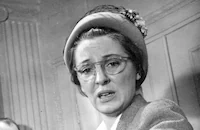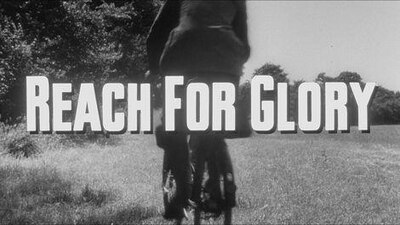Reach for Glory

Brief Synopsis
Cast & Crew
Philip Leacock
Harry Andrews
Kay Walsh
Oliver Grimm
Michael Anderson Jr.
Martin Tomlinson
Film Details
Technical Specs

Synopsis
During World War II, several hundred London school children are evacuated to the small coastal town of Hollysea. Several of the boys attending a local school form a gang under the leadership of Lewis Craig and play war games. Attacks on stray animals and raids against local teenagers form the military activities. John Curlew, whose father has an unimpressive military record from the previous war and whose mother is upset by his court-martialed stance as a conscientious objector, dreams of becoming a war hero but does not get along with the tough gang members. Mr. Stein, a Jewish refugee from Austria, comes to teach at the school, and John is ordered by the headmaster to take care of the teacher's young son, Mark. The rest of the boys torment Mark because of his Austrian-Jewish background and refuse to admit him into their gang. John finally convinces them to allow Mark to join, but during a battle with some local teenagers, Mark panics and betrays the others. Lewis decides he should be court-martialed and shot, and a mock execution is planned. One of the rifles used by the children accidentally contains live ammunition, however, and Mark is killed.

Director

Philip Leacock
Cast

Harry Andrews

Kay Walsh
Oliver Grimm

Michael Anderson Jr.
Martin Tomlinson
Alexis Kanner
Michael Trubshawe
George Pravda
Peter Furnell
James Luck
John Pike
Freddie Eldrett
John Coker
Cameron Hall
John Rae
Melvin Baker
Arthur Hewlett

Alan Jeayes
Richard Vernon
Russell Waters
Pay Hayess
Crew
Maurice Askew
Maurice Binder
John Blezard
Cyril Collick
Frederick Gunn
Bob Huke
Jud Kinberg
Jud Kinberg
John Kohn
John Kohn
Raymond Premru
John Rae
Bob Russell
Don Sharpe
David Tomblin
Frederick Wilson

Film Details
Technical Specs

Articles
Reach for Glory
One of the boys, John Curlew (Martin Tomlinson), is torn between his commitment to the games and his deepening friendship with a young Austrian Jewish refugee, Mark Stein (Oliver Grimm). John is also uncertain about what the reaction might be if the other boys learn that his older brother is not in the armed forces, but is living in London as a conscientious objector.
There are suggestions of a homoerotic undercurrent in the relationship between John and Mark. At first rejected by the others because of his gentle ways and "Germanic" heritage, Mark is finally accepted into the homemade "army" but runs away during a fight over ownership of an antique war medal. Labeling Mark a coward and a "sissy," the others arrange a "court martial" and plan a fake execution that goes tragically awry. A reviewer for Variety wrote that "themes of racism, war hate and its effect on youth, conscientious objection and the consequences of parental weakness on youth are all touched upon."
Reach for Glory was Martin Tomlinson's only screen credit. Oliver Grimm had been a popular child star in Germany before being cast as Mark, and his career continued on and off through 2000. Also prominent in the cast are Harry Andrews and Kay Walsh as John's parents and Michael Anderson as Lewis Craig, the bullying leader of the gang. This was the final film credit for prolific British character actor Allan Jeayes, who plays the role of Crabtree. Reach for Glory won a United Nations Award for "excellence in public service."
The film is directed by Philip Leacock (1917-1990), who began his career in his native England as a director of documentaries before switching to fiction films. In the late 1950s he moved to the U.S., where he continued making feature films before turning to television. As evidenced by Reach for Glory, Leacock had a gift for working with child actors - a talent also displayed in such films as The Kidnappers (1953, known in the U.S. as The Little Kidnappers), which brought honorary juvenile acting Oscars to two of its performers, Jon Whiteley and Vincent Winter; and The Spanish Garden (1956), starring Dirk Bogarde. Leacock once again showed his skill with youngsters by directing segments of the American TV series Eight Is Enough (1977-81).
John Rae (1931-2006), the British author of the novel, was an educator as well as a writer, serving as headmaster of Taunton and Westminster Schools. Rae makes a cameo appearance in Reach for Glory. The Custard Boys was adapted into another film in 1979, this time retaining the novel's original title, with screenplay and direction by Colin Finbow.
By Roger Fristoe

Reach for Glory
Quotes
Trivia
Notes
Released in Great Britain in 1962.















